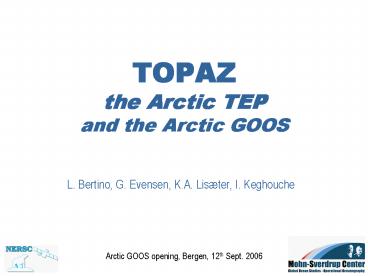TOPAZ the Arctic TEP and the Arctic GOOS - PowerPoint PPT Presentation
1 / 39
Title: TOPAZ the Arctic TEP and the Arctic GOOS
1
TOPAZ the Arctic TEPand the Arctic GOOS
- L. Bertino, G. Evensen, K.A. Lisæter, I. Keghouche
Arctic GOOS opening, Bergen, 12th Sept. 2006
2
Analysis 1st Sept. 2006
Google Earth
3
TOPAZ
- System Description
- Model components
- Assimilation method
- Upgrades
4
Motivation
- Objective
- Provide short-term forecasts of physical and
biogeochemical parameters targeted to users needs
(primarily the offshore oil and gas industry) - Strategy
- Focus on advanced data assimilation techniques
- Gradual increase of resolution
- Nesting on regions of higher interest
- Support
- TOPAZ is the Arctic component of MERSEA IP
- ESA, Industry, private donation (Frank Mohn AS,
Bergen)
5
The TOPAZ model system
- TOPAZ Atlantic and Arctic
- 18-35 km resolution
- 22 vertical layers
- Assimilates
- SLA (4 satellite altimeters),
- SST (from AVHRR),
- ice concentrations (SSM/I)
- Run weekly, ECMWF forcing
- Provides nesting conditions to high-res. models
6
Ice concentration data
- Passive MW (NSIDC)
- Real-time data set (2-3 days delay)
- NORSEX algorithm (Svendsen et al 1983)
- 37GHz, 19GHz
- 25 km resolution
7
Ice extent and ice volume
Solid black line - ensemble mean Dashed black
line - free run Grey - individual ensemble members
8
Barents Sea
9
TOPAZ2 (400x600x22) 20km resolution
TOPAZ3 (800x880x22) 11km resolution
10
TOPAZ UpgradeStronger W. Spitzberg Current
TOPAZ3
TOPAZ2
11
CERSAT - IFREMER
12
The Arctic TEP Thematic Portal
- Common Viewing
- Downloading
- Downscaling
- Validation
- Plan
13
(No Transcript)
14
Live Access Server
15
The MERSEA metrics
16
The MERSEA metrics
- Class1 3D daily averages
- Class2 Sections and moorings
- Class3 derived quantities (fluxes)
- Class4 validation to observations
17
Top 3 m layer
18
100 m depths
19
Validation proceduresagainst in-situ
measurements and climatology
Station at the North Pole TOPAZ profiles In-situ
data from CORIOLIS (Argo, XBT, )
20
Status / Plan
- TOPAZ
- next upgrade (TOPAZ3) Apr. 2007
- Ice drift data assimilation
- Arctic TEP
- Started during the TOP1 period (Oct. 2005)
- Barents Sea model
- Downscaling from TOPAZ.
- Real-time since Sept. 2006.
- MERSEA TOP2 period (Apr. Sept. 07)
- Contributions from all Mersea V2 systems
- More validation metrics
21
Thank You
22
The ingredients
- Models
- HYCOM (U. Miami, USA)
- Ice model
- Biogeoch. model (AWI, D)
- Observations
- Altimetry, SST (CLS, F)
- Sea Ice (NSIDC, USA)
- Sea Ice drift (Cersat, F)
- In-situ (CORIOLIS, F)
- Data assimilation
- Ensemble Kalman Filter Evensen 1994, 2006
23
Ensemble Kalman filteringa stochastic process
Forecast
Analysis
Member1
Member2
2
1
Member99
- Initial uncertainty
- Model uncertainty
- Measurement uncertainty
Member100
3
Observations
24
Assimilation update - Summer
25
Results from TOPAZ and nested models
26
Validation Salinity
27
Validation Temperature
28
Results from a nested model VOLUME TRANSPORTS
How good are the boundary conditions ?
29
Norway-Bear Island
Net transport AW 1.5 Sv/year (1.7 Sv in winter
and 1.3 Sv in Summer) Ingvaldsen et al.,
2004 Net transport NCC 0.5 Sv/year Blindheim,
1989 Net transport BIC -???
30
Bear Island - Svalbard
Recirculation within the Bear Island Trough is
relatively stable at 1.0 Sv Ingvaldsen et
al., 2002
31
Svalbard Franz Josef Land
In gt 0.4 Sv Out gt 0.1 Sv Loeng et al.,
1997 (used Russian literature)
32
Frans Josef Land Novaya Zemlja
In 0 to 0.3 Sv in Summer Out 1.5 Sv
(between 0.6 Sv in Summer and 2.6 Sv in
Winter) Schauer et al., 2002
33
Kara Gate
In 0.1 Sv Out 0.05 to 0.7 Sv Loeng et al.,
1997 (used Russian literature)
34
Planned upgrade -TOPAZ3
35
Expected improvements
- Improved dynamics
- Better resolution of shelf currents (esp. in the
Nordic Seas) - Better fluxes in/out of the Arctic Ocean
- More efficient assimilation of altimetry and
hydrographic profiles.
TOPAZ2
Spitzberg
Norway
Barents Sea opening
TOPAZ3
36
Future Perspectives
- Geographical extension
- Indian ocean (under development)
- Pacific Ocean / South China Sea (Nansen-Zhu,
Beijing) - Exhaustive model validation
- In collaboration with the MERSEA gang
- Real-time assimilation of more observations
- Temperature and salinity profiles (Argo program)
- Ice thicknesses (CRYOSAT)
- Sea surface salinity (SMOS / Aqua)
- New geoid and Mean Dynamic Topography (GOCE)
- Progresses in data assimilation
- Biases, non-linearity, parameter estimation
- Coupling to a global system
- Mercator
37
The end
38
System Applications
- Nested systems in
- North Sea (N. Winther/C. Hansen)
- Gulf of Mexico (F. Counillon)
- Barents Sea (I. Keghouche)
39
Illustr. I. Kerghouche































